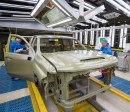The horror chip shortage has just made another victim. Authorities in Albuquerque, New Mexico, are holding back the launch of an innovative hawk signal on a busy street because they don’t have enough chips to power the system.
The new hawk system, whose installation has reached the final stages, can’t yet be activated because of missing chips supposed to power its innovative capabilities.
Announced with much fanfare earlier this year, the hawk signal was supposed to stop speedsters by turning the light to red whenever the vehicle was detected with an over the speed limit. Furthermore, it was designed to provide a safe way to cross the street on a stretch of the road that lacks a crosswalk on a length of over three blocks.
But the chip shortage is now preventing the system from being rolled out, and according to a report, the local authorities have no idea as to when the issue could be resolved. Some explain that getting the necessary chips could take much longer than before the crisis, as it’s estimated that procuring the hardware for the system could require as much as one year.
In the meantime, the entire automotive industry is having a hard time dealing with the lack of semiconductors.
More and more carmakers turn to painful decisions to reduce the disruptions in their production lines, including shipping vehicles without certain systems. For example, BMW has recently started selling cars without touch input, while General Motors previously gave up on heated seats on certain models.
What’s worse is that nobody knows exactly when the chip shortage could be over. While many analysts expected the production to be aligned with the demand at some point in 2022, the global health issue makes the recovery almost impossible on such short notice.
According to some horror forecasts, the chips shortage could last until 2025 unless the health crisis, too, comes to an end sooner.
Announced with much fanfare earlier this year, the hawk signal was supposed to stop speedsters by turning the light to red whenever the vehicle was detected with an over the speed limit. Furthermore, it was designed to provide a safe way to cross the street on a stretch of the road that lacks a crosswalk on a length of over three blocks.
But the chip shortage is now preventing the system from being rolled out, and according to a report, the local authorities have no idea as to when the issue could be resolved. Some explain that getting the necessary chips could take much longer than before the crisis, as it’s estimated that procuring the hardware for the system could require as much as one year.
In the meantime, the entire automotive industry is having a hard time dealing with the lack of semiconductors.
More and more carmakers turn to painful decisions to reduce the disruptions in their production lines, including shipping vehicles without certain systems. For example, BMW has recently started selling cars without touch input, while General Motors previously gave up on heated seats on certain models.
What’s worse is that nobody knows exactly when the chip shortage could be over. While many analysts expected the production to be aligned with the demand at some point in 2022, the global health issue makes the recovery almost impossible on such short notice.
According to some horror forecasts, the chips shortage could last until 2025 unless the health crisis, too, comes to an end sooner.






